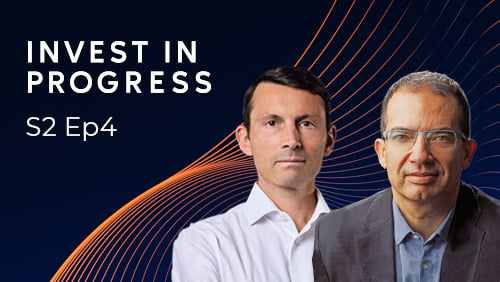April 2021
Article
It's in their DNA
Claire Shaw – Portfolio Director
With innovative management teams and breakthrough-inspiring cultures, Moderna and Illumina have the technology and vision to progress a new era of healthcare.

The value of shares in Scottish Mortgage, and any income from them, can fall as well as rise and investors may not get back the amount invested.
A mutual passion can often help create truly revolutionary work. John Lennon and Paul McCartney changed popular music forever, Larry Page and Sergey Brin brought the internet to our fingertips and Ben Cohen and Jerry Greenfield made life taste that little bit better by inventing novel ice cream flavours. The year 2020 may be remembered for one of the most important collaborations in our generation – that of Illumina and Moderna who, between them, took just four days to crack the codes that are helping solve the Covid crisis. Illumina sequenced the novel coronavirus in two days, with Moderna taking an additional two days to translate that sequencing data into a mRNA molecule which is the basis of its vaccine.
Both companies have different skills and expertise, but they share two traits – a platform technology that has the potential to revolutionise their fields, and a management team whose vision of their industry shatters the status quo. It is sometimes crudely assumed that Scottish Mortgage invests in technology companies, but that misses the point here, as it does with our other holdings. What we are interested in is where technology is applied to enable new ways of doing things and, by doing so, creates new business models in industries – such as healthcare – which perhaps haven’t yet seen that transformational pace of progress. It’s not just about the technology, it’s that in combination with the right people driving it: it takes revolutionary thinkers with an innovative mindset to see their vision through and make this progress happen. That’s what excites us about Moderna and Illumina.
Illumina – The Google of Genomics
On 5 January 2020, at around 2 a.m. following a 40 hour shift, Dr. Zhang and his team at the Shanghai Public Health Clinical Centre sequenced an unidentified virus using Illumina’s NovaSeq™ 6000 System. They published its genome on 10 January, just 10 days after the first case of the virus was reported to the World Health Organisation. An extraordinary achievement, particularly in comparison to the 149 days it took to publish the viral genome of SARS in 2002 and 77 days for the swine flu in 2009. This is an indication of how quickly the healthcare revolution, being enabled by increased computing power, data and technology, is taking hold. It wasn’t until the late 2000s that drastic improvements in genetic sequencing machines, aided by huge leaps in computing power, allowed researchers to more quickly and easily read the complete genetic code of viruses. As Illumina CEO Francis deSouza comments, what the coronavirus pandemic has done is to accelerate the adoption of genomics into the field of infectious diseases by several years.
Illumina’s sequencing machines are estimated to control 90 per cent of the market in the US and compile 80 per cent of genomic information that exists in the world in a given year. The company is sometimes described as the ‘Google of the genomics business’, not just because it commands its market but due to its products’ ability to ’search’ our complete genetic makeup.
The pandemic has changed how Illumina and the importance of genomics in society is viewed by many. deSouza suggests that quietly, in the midst of chaos, the age of rapid sequencing has arrived. Harvard geneticist George Church states that “sequencing is 10 million times cheaper and 100,000 times higher quality than a few years ago”. The implications of faster speeds and falling costs bring us closer to the prospect of personalised medicines and lifestyle plans tailored to our genetic strengths and vulnerabilities.
But to view genetic sequencers as an upgrade on existing technology would be wrong. They should be viewed as a new type of platform technology. It has been the case historically that platform innovations don’t merely create new applications, they create new industries, and we believe the culture at the heart of Illumina is what allows the company to see the scale of this potential. It is interesting to reflect, nearly a decade on, upon our first impressions of Illumina on meeting management:
“We should be very content with the culture of this company. It seems clear that the leadership sees this as a transformational enterprise and that their commitment runs deeper than making money….. I was left with a strong belief that this should be an inspirational and extraordinary business and that it has management that think about it in these terms.”
BG Research Library 2012
Our philosophy of having the patience to back long-term visionary businesses such as Illumina is well established. We acknowledged back in 2012 there may be delays and challenges along the way but in the same breath we also recognised that those at the helm– had huge ambitions. The year 2020 will be remembered as the year in which their ambitions truly materialised and genomics went from the periphery to centre stage in shaping government and public health policy across the world.

Moderna – Predictable, Repeatable, Drugs – In Abundance
deSouza is full of compliments for visionary and ambitious peers such as Moderna and comments how much stronger companies are when they collaborate across borders and industries. While its typically the case that a pharmaceutical company requires samples of a virus to create a vaccine, thanks to Moderna’s mRNA technology, there was no need. Once the genome sequence was publicly available information, Moderna was able to use its revolutionary systems to treat the sequence as though it was software, and crack the next part of the code without even having the virus ‘on-site’. However, pigeonholing the Massachusetts-based Moderna as a vaccine producer echoes the assumption initially made of Amazon that it was a book shop, and belies the scale of its ambitions and the long-term opportunities ahead.
Our relationship with Moderna dates from 2017. From our initial meeting, it was evident this was not just another biotech company. Early stage biotech usually starts with a big idea, raising just enough capital to pursue a narrow subset of such idea. The inherent uncertainty of biotech means there is every chance it doesn’t work out, funding dries up, ending in the inevitable demise of the company. Instead, Moderna’s management sought to raise a huge amount of money to pursue multiple aspects of mRNA as a therapy, knowing that if it could solve the technological challenge of turning mRNA into a drug, the range of applications is almost unlimited.
This is scalability a la the tech industry. In the same way that Amazon invested a lot of capital to build its ecommerce infrastructure, Moderna’s CEO Stéphane Bancel has spent years laying the foundations to scale drug development. With the technology and delivery mechanisms behind its vaccine programme proven, Moderna demonstrates the success of what would appear to be another winning combination – a hybrid between a biotech company and a technology company, its business model driven by big data and machine learning. Learning continuously from clinical trials’ data helps de-risk the pipeline and, ultimately, leads to a higher approval rate. Thus, the scale of the opportunity should expand further, improving the odds of it becoming one of Bessembinder’s infamous outliers, those incredibly rare stocks that contribute to the majority of equity return gains.

Stéphane Bancel’s vision is, ‘Predictable, Replicable Drugs, In Abundance’. His audacious goals and unwavering belief that if you apply a Silicon Valley type mentality to drug development the improvement is not marginal but tenfold, is beginning to bear fruit. It is this founder-led attitude and Moderna’s company culture that attracts us, besides its take on scale. One marker of a great culture is if there is a chasm between the company’s vision of an industry and that of others. Usually this manifests as cynicism from competitors and from those in the media and investment industries, as Elon Musk and Jeff Bezos know all too well. In the early days, there was much criticism of Moderna’s ‘obsession with secrecy’, ‘caustic work environment’ and ‘impossible task of delivering mRNA into the body’. But this organised scepticism is what the science community is predicated on – if you come forward with something that is not fully supported by and connected to the current reality, people don’t know what to do with it.
One of Moderna’s co-founders and current Chairman Noubar Afeyan recently commented that Moderna was fortunate that it had been in existence for nine years prior to the pandemic. It was time that was well-spent, filled with this culture and set of principles, equipping management with a mentality to take on the ‘impossible’. For the past decade, Moderna has been told that everything it was doing was impossible, improbable or undesirable but there was very little doubt in the minds of Moderna’s leadership team that they could go from the sequence to the vaccine in a short space of time. They had done it many times before – it was just that the speed wasn’t needed or appreciated by anyone.
Moderna’s philosophy of ‘not growing up in public’, as well as only courting serious investors, have ultimately paid dividends. Segments of the market still believe Moderna is a one trick pony. Yet in the 10 years since inception, it has transformed from a research stage company, advancing programmes in the promising-but-still-unproven field of mRNA, to an enterprise with its first medicine having treated millions of people, and a diverse pipeline attempting to find cures for the ‘big killers’ – cardiovascular disease, cancer, infectious disease and autoimmune diseases. We are excited to see what the future holds for Moderna – as Bancel has said, “there are more than 500 ways to describe what Moderna could become”.
Concluding Thoughts
One of the big positives of 2020 was our witnessing the radical accelerated adoption of science and technologies in the healthcare industry down from years to months, weeks and days. Illumina and Moderna are at the forefront of this revolution, with exceptional management teams at the helm and a desire to bring about fundamental change in their fields. The Scottish Mortgage Team believes this show-stopping pair is set to help the healthcare industry go from strength to strength in the years ahead.
About the author - Claire Shaw
Portfolio Director
Claire Shaw is a portfolio director and plays a prominent role in servicing Scottish Mortgage’s UK shareholder base. Before joining in 2019, she spent over a decade as a fund manager with a focus on managing European equity portfolios for a global client base. With a background in analysing companies and communicating investment ideas, Claire is also responsible for creating engaging content that makes the Scottish Mortgage portfolio accessible to all its shareholders. Beyond that, she works closely with the managers, meeting with portfolio companies and conducting in-depth portfolio discussions with shareholders.
Important information
This communication was produced and approved at the time stated and may not have been updated subsequently. It represents views held at the time of production and may not reflect current thinking.
This content does not constitute, and is not subject to the protections afforded to, independent research. Baillie Gifford and its staff may have dealt in the investments concerned. The views expressed are not statements of fact and should not be considered as advice or a recommendation to buy, sell or hold a particular investment.
Baillie Gifford & Co and Baillie Gifford & Co Limited are authorised and regulated by the Financial Conduct Authority (FCA). The investment trusts managed by Baillie Gifford & Co Limited are listed on the London Stock Exchange and are not authorised or regulated by the FCA.
A Key Information Document is available by visiting our Documents page.
Any images used in this content are for illustrative purposes only.








